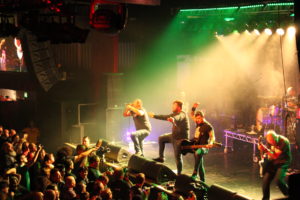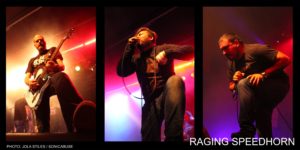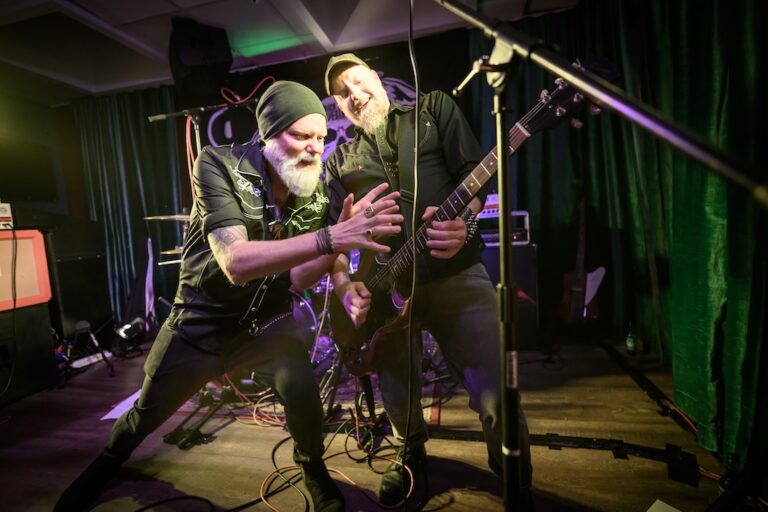It’s not often that we get the opportunity to speak to the brains behind a given event, but our experiences at Hard Rock Hell Doom Vs Stoner were so overwhelmingly positive, that we were very keen to speak to the man behind it all. John Davis, an experienced events manager, promoter and the mastermind at the heart of the Hard Rock Hell brand, very kindly took a few moments out of a hectic schedule to sit down with us and speak about the genesis of Hard Rock Hell, the challenges faced by a growing festival and how to stay ahead in a competitive market. Refreshingly, his insights were centred not on money, but on the importance of the community and spirit that fires the festival and his commitment to providing an experience for his audience helps to explain just why the Hard Rock Hell brand has such a loyal following.

You’ve got the tenth anniversary coming up of the HRH Winter festival and you’ve got a number of other smaller festivals such as Doom Vs Stoner throughout the year, and in a very competitive market, when a lot of other festivals seem to struggle, the HRH brand seems to be growing and I was wondering what you felt it was that allowed that to happen?
There’s a simple answer to that. Everything that we’ve done since we started ten years ago has come from a very organic community. We were prepared to start an event with 100 people, it turned out to be 500, it didn’t matter as long as we got people with similar values. And similar values are quite simple, a love for a certain style of music, a love for the company of people that enjoy that music as well, and a love for the whole experience – being together and, maybe, non-traditional festival models. I think that you get to a certain age, you grow out of certain things and people want a few more luxuries and maybe a different type of crowd and things done differently. And that’s how it started. And since the first day of that organic community, they’ve really steered us in every direction that we’ve gone. Everybody likes a mash up of rock and metal but then they’ve got a certain niche that they really love to dive into. Some people love rock, some people really love AOR, some of them doom or stoner metal or whatever it may be, and within that there’s another community and they’ve pushed us towards that, they curate it with us – they basically state what they want. It’s not rocket science, it’s just an internal thing they’ve asked us to do and, really, a lot of things on the table for the next three years to be honest. And I’m not having trouble keeping up with it as long as I keep seeing what’s happening here – that the thing’s naturally working and people are genuinely… I was just speaking to Raging Speedhorn just now and they’re so emotional – it’s like “thank god someone’s put on an event like this, with so much of this music and people who all like this music in the same place” in this multi-arena experience, you know? But the fans told us to do that, it wasn’t me, it was the fans; and I think the rule of thumb here is quite simple, if you’ve got a natural affinity with the front line, then the front line will lead you to where you need to go.
The word you mentioned a lot there was ‘community’, and this is the first HRH I’ve been to and the first thing I’ve noticed is how friendly everyone here is from the security to the food vendors, and that sort of community spirit has got to be integral to the strength of the festival…
100% – when we move to a new venue or an existing venue, the primary negotiation isn’t about money, it’s about who the management team is and how can they react to what we require. There are certain things that I really hate about festivals and the first is queue culture. I don’t have queues, I kill queues. I used to run an airline and I used to explain to them how you don’t have queues at an airport. There’s a solution for everything. I don’t think people should be waiting any more than 10-15 seconds for a drink. How do you do that? You mob it – you know when people are going to be going to the bar, you overstaff it at those points, it’s simple. And I think if you actually look at every area of experience it comes a bit more serious, you know. People shouldn’t have to wait or be distracted by anything. They should be here to talk to their mates, have an easy, walk-through access to whatever they want, be served when they want and see really good frigging music with a brilliant sound and light system. Who I work with, it takes a lot for them to achieve that. As silly as it sounds, there are only certain people I work with. The guys in Sheffield have got it perfect this week.
You said that the fans push you in various directions and towards more niche events such as Doom Vs Stoner, it’s an amazing line up, but was it a challenge to try to curate an event that fell into that niche?
I wouldn’t say it was a challenge. It’s more about programming an adventure, if you can call it that, you know? Because you start off with, obviously, the key bands and then you’ve got to program downwards rather than program upwards. However, we always dedicate 40% of our line up to new, breaking, upcoming bands – it’s really important for going forward – but it’s like everything. The fans vote for what they want, they’ve already given me the line-up for next year, we already know who we’re getting because they voted for it, it’s nothing to do with me , I don’t want to say ‘there’s the event, let’s see how it goes’ – they’re going to get exactly what they want plus more. I always shove a couple of curveballs in there, I mean I shoved Angel Witch in there last night and it was like “well, they’re not really doom or stoner” and I thought “no, but it’s great entertainment!” And everyone loved it and it was a curveball. Why did we do that? We’re HRH and we do that sort of shit, we mix it up… mash it up, you know?
You mentioned things you don’t like about festivals and how that inspired you to do it differently and, again, coming into it for the first time, there are so many little things you notice here that other festivals don’t do – for example something simple like putting up the times of all the bands that are playing later between sets. It’s such a small, simple thing and I can’t get why more people don’t do that…
It’s silly, you know, I put them above urinals, I put them on the back of toilet doors. I think, as much as we’ve got the technological age here, where you can communicate with people a lot easier, no matter how many times you tell them, it’s like an eye ball thing, by the time they’ve seen it three or four times, they get it. So that’s what we do. It might start off with an email, then an SMS, then a Facebook post, then a reminder, then another reminder so that, by the time people get here, everyone’s absolutely clear on how it all works. That’s nice.
How did you get into promoting in the first place – what made you decide to start off HRH?
It’s a really funny story, actually. I used to be involved in the leisure business; in fact I ran one of the biggest holiday companies in the world, with thousands of staff, airlines, hotels and so on. At that point we were backed by a lot of Germans who had a different approach to what we should be doing. My thing to them was always: anybody can book flights and anybody can book accommodation – what we should really think about is how to curate the experience at the destination to make it differentiated from everything else. They didn’t get it. So I said “I’ll tell you what, let me go and do this project for you.” The first project was HRH back in 2007 in Minehead, where I bought down a lot of suits to this purpose-built, entertainment centre and a lot of heavy metal bands from Twisted Sister to Saxon to UFO and Cradle of Filth… they stood there and they were like “what the fuck are you doing?” and I said “well, it’s sold out though, boys, isn’t it?!” That was great, but that particular company sold out their shares in it, so part of my exit plan was that I took the brand with me, because I created it, and we just started building on it and it’s been a steady expansion. Even five years ago, people said to us that they really wanted an AOR event; they wanted our interpretation of an AOR event.
The thing is, Hard Rock Hell is our Winter festival which is a complete mash up of stuff on the stage. You can go from blues rock to AOR to thrash in the space of three bands. It doesn’t follow any programme, it is that mental. When it comes to niche genre-led brands, we stuck the HRH in front of it just to represent the expertise and give that peace of mind when it comes to organising things, but our interpretation is not going to be just that genre. AOR for me is melodic rock and it goes from the lightest end to the hard side and that’s how we spike it up. You know, we started AOR in a steelwork in Rotherham five years ago as an experiment and now we’ve actually got the biggest AOR festival in Europe and it’s doubled in size for next year. You must follow that pattern, and as people keep saying to us, as long as we do what they ask, they’re there with us all the way, you can never have a nicer endorsement than that.
The other thing that I’ve noticed is that you’re always out and about in the festival checking out the bands, which is really nice to see. Is there any particular genre that you like, or are you as eclectic in taste as your line ups?
There’s an interesting story behind this as well. I’ve always been a biker and I’ve always been a rocker, and I’ve been an artist. And I won’t get into that too much, but I’ve had my number ones around the world and I’ve sold quite a lot of records, but it’s my darkest past, and I keep that to myself. So from that, from being in a recording studio quite a lot and being on stage, I tend to understand all types of music. If you looked at my iPod, and I guess most people would classify their taste from that, my love has always been classic rock and classic metal. However, I also play guitar and when you get into stoner riffs and things like that, that sort of shit appeals to me. I think anybody with a little bit of differentiation or out-of-the-box thinking always appeals, so I’m always sat there watching artists and I appreciate what people do. It’s not a case of liking one thing more than another because I think sometimes you can sound like one thing on an album and your live performance is totally different and your live performance should be so much better than the actual disc, although it’s not always the case. We reach out far and wide. A lot of the things I’m doing now with the stage two and stage three stuff is, we’re really going to not just break the new bands in the UK but, to go right out around the world. We spend a year doing the stage two stuff, and Hard Rock Hell X in November, we’re bringing five bands from Australia – they’d never get a chance to do that, but Cherry Grind, Black Aces, Tequila Mockingbyrd, Hail Mary and Massive all playing together, sponsored by the Australian government – loving it! And they’re going to go mental at that weekend and these people would never get a chance to see it, but they are fucking huge down in Australia man and they’re cracking it at the moment. It just needs that little bit of spark and likewise, as a label and everything we do, we’re introducing our bands into other territories as well, which keeps the love going.
It’s interesting that you’ve been artist because I think it shows in the way all the bands are treated with respect – everyone’s got an hour and whatever when so many festivals rattle out the smaller acts – twenty minutes or thirty minutes or whatever and you never get a chance to see them properly.
Yeah, and that’s it. Don’t get me wrong, some of the bands I give an hour to, some of the bands are like “Christ! I don’t know if we can do an hour.” And I’ll say “come on! Think about it! You’ve got an hour on stage – use it!” and that’s challenging as well, but you get the magic flowing out from that and that makes it special too.
Final question, it’s the tenth anniversary and you’ll be celebrating the event, but what plans are there for the future? I know that you’ve got Doom Vs Stoner 2 already planned…
Well the city experience stuff is going really well. Doom vs Stoner has been great, NWOBHM, which, again, is another new event and it’s where the movement started, you know, it should be a celebration of these things. That’s an interesting one because we’ve got 33% of the people are flying in from South Korea, Los Angeles, Australia, coming to this event. It’s so big and it’s been sold out for months so that was a great thing for us. Then we’re doing the new metal thing which is a different interpretation with lots of new bands and we’ve got a couple of big surprises for ’17 and even more for ’18. But that’s just the UK. The next… we’re setting up different territories just now, and we’re now moving into Australia and New Zealand officially… you’re actually probably the first person to know that, but we’ll be doing Singapore, Australia and New Zealand by the end of the year.




